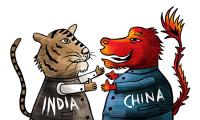India Opposes E-commerce Duty Moratorium at WTO Meeting
India will oppose extending the WTO moratorium on customs duties for e-commerce trade, citing its impact on developing countries and potential revenue losses. The issue will be discussed at the upcoming ministerial meeting in Abu Dhabi.
New Delhi, Feb 20 (PTI) India is not in favour of further continuation of moratorium on customs duties on e-commerce trade at the WTO's meeting in Abu Dhabi later this month as it is impacting the developing countries, an official said on Tuesday.
The official said that there is a work programme on e-commerce trade and the members of the World Trade Organisation (WTO) should continue to discuss the issue under that.
"We are not in favour of extension. We are in favour of continuation of the work programme. There is a need to look at the subject from a development dimension and not from the eyes of big tech companies," the official said.
There is a need to discuss the scope of moratorium as there are revenue implications because of it.
As per estimates, the potential tariff revenue losses to the developing countries are about USD 10 billion every year. For India, it could be over USD 500 million every year.
"There is a need for a clear definition of e-commerce trade. We need policy space for the sector," the official added.
The subject would figure prominently in the meeting of 164 trade ministers who would gather in Abu Dhabi from February 26-29.
The World Trade Organisation (WTO) members have agreed not to impose customs duties on electronic transmissions since 1998 and the moratorium has been periodically extended at successive ministerial conferences (MC), which is the highest decision-making body of the 164-member body.
India and South Africa on several occasions have asked the organisation to revisit the issue and have highlighted the adverse impact of the moratorium on developing countries.
India is witnessing a rise in imports of electronic transmissions, mainly of items like movies, music, video games and printed matter, some of which could fall within the scope of the moratorium.
While the profits and revenues of digital players are rising steadily, the ability of the governments to check these imports and generate additional tariff revenues is being limited because of the moratorium.
Developed countries the US, Australia, and Japan want an extension of the moratorium.
The official said that there is a work programme on e-commerce trade and the members of the World Trade Organisation (WTO) should continue to discuss the issue under that.
"We are not in favour of extension. We are in favour of continuation of the work programme. There is a need to look at the subject from a development dimension and not from the eyes of big tech companies," the official said.
There is a need to discuss the scope of moratorium as there are revenue implications because of it.
As per estimates, the potential tariff revenue losses to the developing countries are about USD 10 billion every year. For India, it could be over USD 500 million every year.
"There is a need for a clear definition of e-commerce trade. We need policy space for the sector," the official added.
The subject would figure prominently in the meeting of 164 trade ministers who would gather in Abu Dhabi from February 26-29.
The World Trade Organisation (WTO) members have agreed not to impose customs duties on electronic transmissions since 1998 and the moratorium has been periodically extended at successive ministerial conferences (MC), which is the highest decision-making body of the 164-member body.
India and South Africa on several occasions have asked the organisation to revisit the issue and have highlighted the adverse impact of the moratorium on developing countries.
India is witnessing a rise in imports of electronic transmissions, mainly of items like movies, music, video games and printed matter, some of which could fall within the scope of the moratorium.
While the profits and revenues of digital players are rising steadily, the ability of the governments to check these imports and generate additional tariff revenues is being limited because of the moratorium.
Developed countries the US, Australia, and Japan want an extension of the moratorium.
You May Like To Read
TODAY'S MOST TRADED COMPANIES
- Company Name
- Price
- Volume
- Vodafone Idea L
- 8.10 (+ 18.94)
- 352105814
- GTL Infrastructure
- 1.50 (+ 7.14)
- 20982285
- G G Engineering
- 0.90 (+ 11.11)
- 20091512
- AvanceTechnologies
- 0.54 ( -8.47)
- 18780688
- YES Bank Ltd.
- 17.33 (+ 2.61)
- 14468025






 © 2025 Rediff.com India Limited. All rights reserved.
© 2025 Rediff.com India Limited. All rights reserved.